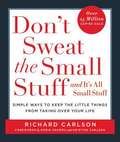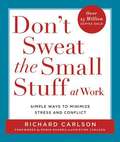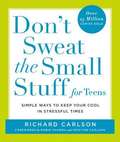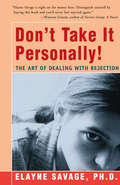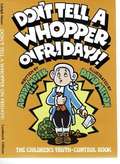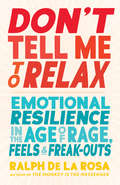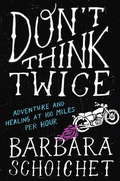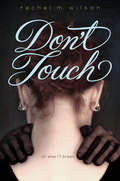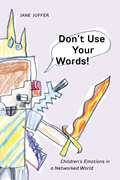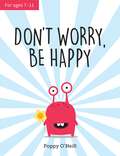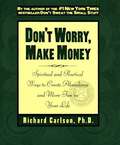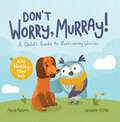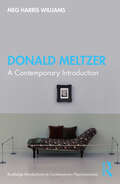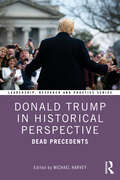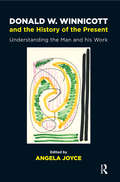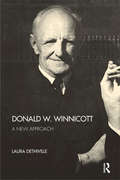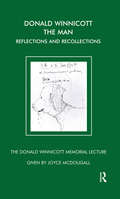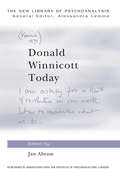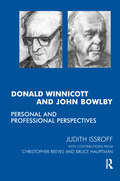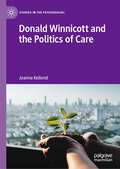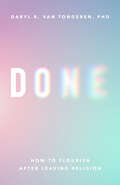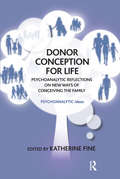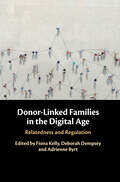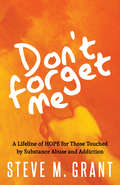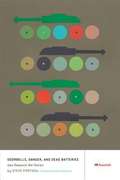- Table View
- List View
Don't Sweat The Small Stuff...and it's all small stuff
by Richard CarlsonFrom the back cover: Don't Sweat the Small Stuff...and it's all small stuff is a book that shows you how to keep from letting the little things in life drive you crazy. Dr. Richard Carlson using an insightful language shows ways to calm down in the midst of your incredibly,hurried, stress-filled life.
Don't Sweat the Small Stuff at Work: Simple Ways to Minimize Stress and Conflict While Bringing Out the Best in Yourself and Others
by Richard CarlsonThe author reveals tips that will transform your outlook at the office, easing stress there, and also leading to a happier life at home.
Don't Sweat the Small Stuff for Teens: Simple Ways to Keep Your Cool in Stressful Times
by Richard CarlsonThis is a self-help book for teens that offers tips on how to manage the small problems in a teen's life so they don't turn into larger ones. Each of the 100 tips is explained, including an example in a short, easy to read, chapter.
Don't Take It Personally: The Art of Dealing with Rejection
by Elayne SavageWho hasn't felt the sting of rejection? It doesn't take much for your feelings to get hurt--a look or a tone of voice or certain words can set you ruminating for hours on what that person meant. An unreturned phone call or a disappointing setback can really throw you off your center. It's all too easy to take disappointment and rejection personally. You can learn to handle these feelings and create positive options for yourself. Don't Take It Personally! explores all forms of rejection, where it comes from, and how to overcome the fear of it. Most of all, you'll learn some terrific tools for stepping back from those overwhelming feelings. You'll be able to allow space to make choices about how you respond. --Understand the effect that anxiety, frustration, hurt, and anger have on your interactions with others. --De-personalize your responses and establish safe personal boundaries that protect you from getting hurt. --Practice making choices about the thoughts you think and the ways you respond to stressful situations. --Understand and overcome fear of rejection in personal and work relationships. Elayne Savage explores with remarkable sensitivity the myriad of rejection experiences we experience with friends, co-workers, lovers, and family. Because her original ideas have inspired readers around the world, Don't Take It Personally! has been published in six languages.
Don't Tell A Whopper on Fridays!: The Children's Truth-Control Book
by Nancy R. Thatch David Melton Adolph J. MoserSuggesting ways that can help children tell the truth instead of lying, Dr. Moser and David Melton make their point with humorous illustrations and informative text. Full color.
Don't Tell Me to Relax: Emotional Resilience in the Age of Rage, Feels, and Freak-Outs
by Ralph De La RosaA handbook for staying grounded, emotionally connected, and empowered regardless of what's in the headlines and who's in your face.From politics, climate change, and the economy to racism, sexism, and a hundred other kinds of biases--things have never felt so urgent and uncertain. We want to take action, but so many of us struggle with overwhelm and burnout. And on top of it all, we get so many messages telling us to relax, to "let it go" and feel some other way about things. We'd like to think that emotional intelligence and mindfulness will help--but why do these approaches so often fall short in fever-pitch moments?In his warm, funny, streetwise style, Ralph De La Rosa offers tools for coping in contentious times. Full of insights and practices addressing everything from trauma triggers to privilege guilt and the art of saying no, Don't Tell Me to Relax brings the welcome news that our thoughts and emotions are not the enemy. Rather, when met skillfully, they can light the way to self-empathy, social understanding, and an activism that has room for both inner and outer work.
Don't Think Twice: Adventure and Healing at 100 Miles Per Hour
by Barbara SchoichetA late-in-life coming-of-age escapade told with humor and heart, Don't Think Twice is a moving and irreverent account of grief, growing up, and the healing power of adventure. Within six months, Barbara Schoichet lost everything: her job, her girlfriend of six years, and her mother to pancreatic cancer. Her life stripped bare, and armed with nothing but a death wish and a ton of attitude, Barbara pursues an unlikely method of coping. At the age of fifty she earns her motorcycle license, buys a Harley on eBay from two guys named Dave, and drives it alone from New York to Los Angeles on a circuitous trek loosely guided by her H.O.G. tour book and a whole lot of road whimsy. On the open highway--where she daily takes her speed to a hundred--Barbara battles physical limitations and inner demons on a journey that flows through the majestic Appalachian Mountains, the enchanting Turquoise Trail, and all along America's iconic Route 66. She is awed by the battlefields in Gettysburg, stunned by the decadence of Graceland, and amused by a Cadillac graveyard in the middle of nowhere. She meets kind strangers, odd strangers, and a guy who pulls a gun on her for cutting him off. She is vulnerable but sassy, broken but determined to heal . . . or die trying.From the Hardcover edition.
Don't Touch
by Rachel M. Wilson<P>Step on a crack, break your mother's back,Touch another person's skin, and Dad's gone for good . . .Caddie has a history of magical thinking--of playing games in her head to cope with her surroundings--but it's never been this bad before. <P>When her parents split up, Don't touch becomes Caddie's mantra. Maybe if she keeps from touching another person's skin, Dad will come home. She knows it doesn't make sense, but her games have never been logical. <P>Soon, despite Alabama's humidity, she's covering every inch of her skin and wearing evening gloves to school.And that's where things get tricky. Even though Caddie's the new girl, it's hard to pass off her compulsions as artistic quirks. Friends notice things. <P>Her drama class is all about interacting with her scene partners, especially Peter, who's auditioning for the role of Hamlet. Caddie desperately wants to play Ophelia, but if she does, she'll have to touch Peter . . . and kiss him. <P>Part of Caddie would love nothing more than to kiss Peter--but the other part isn't sure she's brave enough to let herself fall. <P>From rising star Rachel M. Wilson comes a powerful, moving debut novel of the friendship and love that are there for us, if only we'll let them in.
Don't Use Your Words!: Children's Emotions in a Networked World
by Jane JufferHow children are taught to control their feelings and how they resistthis emotional management through cultural production.Today, even young kids talk to each other across social media by referencing memes,songs, and movements, constructing a common vernacular that resists parental, educational, and media imperatives to name their feelings and thus control their bodies. Over the past two decades, children’s television programming has provided a therapeutic site for the processing of emotions such as anger, but in doing so has enforced normative structures of feeling that, Jane Juffer argues, weaken the intensity and range of children’s affective experiences.Don’t Use Your Words! seeks to challenge those norms, highlighting the ways that kids express their feelings through cultural productions including drawings, fan art, memes, YouTube videos, dance moves, and conversations while gaming online. Focusing on kids between ages five and nine, Don’t Use Your Words! situates these productions in specific contexts, including immigration policy referenced in drawings by Central American children just released from detention centers and electoral politics as contested in kids’ artwork expressing their anger at Trump’s victory. Taking issue with the mainstream tendency to speak on behalf of children, Juffer argues that kids have the agency to answer for themselves: what does it feel like to be a kid?
Don't Worry, Be Happy: A Child's Guide to Overcoming Anxiety
by Poppy O'NeillDoes your child appear to worry a lot?Perhaps they have frequent tummy upsets, or are irritable, tearful, angry or withdrawn? Do they have problems concentrating or show a loss of enthusiasm for their usual interests?These could all be signs that your child is struggling with anxiety.This practical guide combines proven cognitive-behavioural therapy methods used by child psychologists in schools with simple activities to help your child to overcome anxiety. It’s aimed at children aged 7–11 because a lot happens in these years that can impact a child’s emotional well-being, not just now but for years to come.Your child will be guided, with the help of Fiz – a friendly and supportive character they can identify with – through fun and engaging activities which are interspersed with useful tips, inspirational statements and practical information for parents.
Don't Worry, Make Money: Spiritual and Practical Ways to Create Abundance and More Fun in Your Life
by Richard Carlson"Richard Carlson provides one hundred new strategies for living more fully and worrying less as a means of attracting more wealth and abundance in our lives. Often we get into the trap of thinking that the only way to earn a good living is to stay late at the office, feeling stressed out and full of anxiety. However, this can actually get in the way of having a productive and rewarding career, and can drastically decrease our earnings. In thought-provoking, unique pieces, Carlson shows us how to invest in the market, instead of worrying about it; how to get real mileage out of reflection; how to make a truly great impression on clients; how taking your lunch break (instead of working through it) may pay off in more ways than you think; and how we shouldn't rely on too much data in making decisions." "Accept the fact that you can make excuses, or you can make money, but you can't do both," Carlson tells us, as he shows us how to spend most of our work time on the "critical inch" of our business, instead of on the peripheral agendas that don't really earn the big bucks. He tells us how to be prepared to walk away from any negotiation, and how this attitude will help us to strike better deals. And he reveals specific money strategies, such as why it's better to buy large deductible insurance, how to decide between a fixed and variable interest rate on a mortgage, and how to save two years of living expenses for when the unexpected happens." "Full of interesting and unique ideas for the overworked business person, Don't Worry, Make Money shows readers how to live a life that's more wealthy, productive, and carefree by refusing to let worry get you down."--BOOK JACKET. Title Summary field provided by Blackwell North America, Inc. All Rights Reserved
Don't Worry, Murray!: A Child's Guide to Help Overcome Worries
by Anna AdamsIt’s Murray’s first day at school and he can’t wait to start his next BIG adventure. Then he starts to worry... With help from Hoots the owl, Murray makes it the Worry Hill and fights his fears along the way! An encouraging and thoughtful book, Don’t Worry, Murray! teaches children how to understand their worries and bring them calmly under control.
Donald Meltzer: A Contemporary Introduction (Routledge Introductions to Contemporary Psychoanalysis)
by Meg Harris WilliamsIn this intelligent and insightful work, Meg Harris Williams presents a clear and readable introduction to the works of influential psychoanalyst Donald Meltzer. The book covers Meltzer’s ideas on key themes including sexuality, dreams, psychosis, perversion and aesthetics, and his work with both children and adults. This book focuses especially on Meltzer’s views on the nature of psychoanalysis itself, as an investigative method conducted by the cooperation between two people. His intuitive understanding of dreams is underscored by a scholarly interest in philosophy and linguistics. The book will give readers a window into Meltzer’s clinical seminars and supervisions, as well as a comprehensive overview of his published work, all thoughtfully brought together by someone who worked with Meltzer for many years. Bringing Meltzer’s ideas into contemporary context, this fresh approach to his work makes his rich and complex theories about our inner world accessible to all. Part of the Routledge Introductions to Contemporary Psychoanalysis series, this book will be of great importance to psychoanalysts, clinicians and scholars familiar with Meltzer’s ideas, as well as those seeking an introduction to his work.
Donald Trump in Historical Perspective: Dead Precedents (Leadership: Research and Practice)
by Michael HarveyDonald Trump in Historical Perspective: Dead Precedents is a collection of chapters that utilizes the thinking of historians, philosophers, and political scientists to explore historical parallels to the presidency of Donald J. Trump, the 45th President of the United States of America. This collection provides an extensive analysis on the ways Trump’s impulsiveness, breaking of norms, and disregard for longstanding democratic pieties, caused him to represent a definitive end to the "American century," an era when American self-confidence, steadiness, and leadership, even in the face of titanic challenges, were almost universally taken for granted. Yet this book also argues how in the longer sweep of history, Trump is a familiar figure in the turbulent life of democracies. These in-depth chapters reveal the ways Trump represents the anti-institutionalist, the populist demagogue, the would-be authoritarian who exploits electoral and political vulnerabilities to gain and hold power. Through these detailed evaluations, these chapters suggest that Trump is not radically unique, but that democracies have produced many previous versions of the Trump phenomenon. This book is essential reading for scholars and students in political science, political theory, history, and leadership. This book is also noteworthy for readers interested in key developments in contemporary American democracy. One of its greatest appeals is its extensive look into leadership on an international scale, from Donald Trump’s global significance to various explorations of non-American leaders, and the comparisons that can be made.
Donald W. Winnicott and the History of the Present: Understanding the Man and his Work
by Angela JoyceIn November 2015, The Winnicott Trust held a major conference in London to celebrate the forthcoming publication of the Collected Works of D. W. Winnicott. Most of the papers given then now constitute the chapters in this book. It not only reflects the ongoing contemporary relevance of Winnicott's work, clinical and theoretical, but these chapters demonstrate the aliveness of Winnicott's contribution as present day practitioners and academics use his ideas in their own way. The chapters range from accounts of the early developmental processes and relationships (Roussillon, Murray), the psychoanalytic setting (Bolognini, Bonaminio, Fabozzi, Joyce, Hopkins) creativity and the arts (Wright, Robinson), Winnicott in the outside world (Kahr, Karpf), to the challenge to the psychoanalytic paradigm that Winnicott's ideas constitute (Loparic).
Donald W. Winnicott: A New Approach
by Laura DethivilleWinnicott was continually innovating, inventing, and proposing unexpected solutions in his analytical work whenever he noticed that clinical experience "didn't stick to the theory". This approach can make his work seem rather diffuse, with concepts that are sometimes confusing and needing to be clarified. Laura Dethiville has taken on the task of re-evaluating and explaining the principal rudiments of his theories, such as the transitional object, the self, the false self, the importance of environment, and dissociation. She also reveals how Winnicott showed himself to be a forerunner in the care of symptomatic illness in our society, including his innovative treatment of loss of identity, anorexia or bulimia, delinquency, psychosomatic illness, and school disorders. In this book the author has succeeded in avoiding psychoanalytic jargon and, although initially aimed at psychoanalysts, it is also accessible for educators, child carers, paediatricians, and to all those interested in early childhood, the constitution of the psyche, and the constitution of the interpersonal link.
Donald Winnicott The Man: Reflections and Recollections (The Donald Winnicott Memorial Lecture Series)
by Joyce McDougallThis book presents the Donald Winnicott Memorial Lecture, an annual event designed for a wide audience of professionals and other involved with children. These lectures focus upon a specific topic, arising from Winnicott's life and ideas, in terms of relevance for twenty-first century living.
Donald Winnicott Today (The New Library of Psychoanalysis)
by Jan AbramWhat in Winnicott’s theoretical matrix was truly revolutionary for psychoanalysis? In this book, the editor and contributors provide a rare in-depth analysis of his original work, and highlight the specifics of his contribution to the concept of early psychic development which revolutionised the theory and practice of psychoanalysis. Including re-publications of selected Winnicott papers to set the scene for the themes and explorations in subsequent chapters, the book examines how Winnicott expanded Freud’s work, and how his discourse with Melanie Klein sharpened his thought and clinical innovations. Divided into 3 sections, it covers: Introductory overviews on the evolution of Winnicott’s theoretical matrix Personal perspectives from eminent psychoanalysts on how Winnicott’s originality inspired their own work Further recent examinations and extensions including new findings from the archives Drawing on her own extensive knowledge of Winnicott and the expertise of the distinguished contributors, Jan Abram shows us how Winnicott’s contribution constitutes a major psychoanalytic advance to the concept of subjectivity. As such, it will be an inspiration to experienced psychoanalysts, psychotherapists and all those interested in human nature and emotional development.
Donald Winnicott and John Bowlby: Personal and Professional Perspectives
by Christopher Reeves Bruce HauptmannA fascinating book that sets Bowlby and Winnicott in context and relation to one another to provide a new perspective on both, as well as providing a welcome testimony to their enduring legacy.
Donald Winnicott and the Politics of Care (Studies in the Psychosocial)
by Joanna KellondThis book explores the significance of psychoanalyst Donald Winnicott’s ideas for contemporary debates about care. Locating Winnicott in relation to a range of fields, including psychology, philosophy, sociology, critical theory and feminist theory, it examines the implications of his thinking for understanding and transforming the relationship between care and society. Winnicott was unique amongst psychoanalysts for the emphasis he placed on care in the development of subjectivity. The book unpacks Winnicott’s understanding of care and assesses its relevance for conceptions of social responsibility, justice and transformation. In a world where care is in crisis, how might we theorise the conditions necessary for the development of caring subjectivities, and is it possible to infer a relationship between those conditions and progressive social change? This unique book will be of interest to readers in psychosocial studies, politics and anyone concerned with thinking about the relationship between care and social transformation.
Done: How to Flourish After Leaving Religion (APA LifeTools Series)
by Daryl R. Van TongerenThis book draws from cutting-edge psychological research to provide advice for people who are undergoing religious change. Americans today are leaving religion in record numbers. For many, the faith, practices, and institutions that once provided comfort and guidance no longer fit their beliefs and values. This shift often comes with a price, however. While turning away from religion can bring about freedom, awe, and wonder, it can also engender a profound loss of meaning, purpose, community, and identity. It can threaten our relationships with friends and family. And it can pose a significant challenge to the mental health of even the most resilient among us. How can people who are no longer served by traditional religion find new meaning and purpose? How can they process the grief that often accompanies religious or spiritual change? And how can they address challenging interpersonal relationships with people who do not support or understand their religious change? In this book, psychologist Daryl Van Tongeren draws from psychological theories and research to examine the emotional and social processes involved with religious change and offers science-based guidance for building a new life—with or without religion. If you are rethinking your religious beliefs, have experienced religious loss or struggle, or have undergone a significant religious change, you are not alone. By understanding how people before us have left or transformed their religion, we can discover new ways of finding peace, experiencing meaning, and, if desired, engaging with the transcendent. Let their wisdom—and this book—be your guide.
Donor Conception for Life: Psychoanalytic Reflections on New Ways of Conceiving the Family (Psychoanalytic Ideas And Applications Ser.)
by Katherine FineThis book is about the psychological experiences of women and men who have used donor conception to create their families. The authors offer diverse accounts of their clinical, research, and personal experiences. They describe the challenge of powerful conscious and unconscious fantasies that can be aroused and how these may reawaken early anxieties and developmental struggles. Whilst recipients of donated eggs or sperm may think they are simply acquiring a factor of reproduction, they are also receiving the genetic history of another family. The sensitive management of these relationships is considered in relation to establishing healthy and well-functioning families. The way these emotional challenges are negotiated is likely to be reflected in how parents talk with children about their donor origins.
Donor-Linked Families in the Digital Age: Relatedness and Regulation
by Fiona Kelly Deborah Dempsey Adrienne ByrtHow are siblings who were conceived using the same sperm or egg donor making connections in the absence of legal support? What is it like to discover you are part of a 50+ donor sibling group? How are donor conceived adults using new technologies to connect with genetic family and explore their identity? This edited collection considers the donor linking experiences of donor conceived adults and children, recipient parents, and donors in a global context. It includes contributions from legal academics, social workers, sociologists, psychologists, and policy makers who work in the assisted conception field. As a result, it will be of particular interest to scholars of reproductive law, sociology, and digital media and reproductive technologies. It will also engage those following the debate around donor linking and the use of do-it-yourself technologies, including direct-to-consumer genetic testing and social media.
Don’t Forget Me: A Lifeline of HOPE for Those Touched by Substance Abuse and Addiction
by Steve M. GrantDon’t Forget Me is a survival manual and a lifeline for those whose lives have been touched by substance use and addiction. With the pervasiveness of drugs today and death by overdose as the leading cause of death for people under 50 in the US, almost everyone has been directly or indirectly affected by this drug epidemic. Loving someone with substance abuse can be terrifying. Steve Grant shares what he learned during his own difficult journey to encourage and guide other parents who are living with children who are struggling with substance abuse. Don’t Forget Me tells the story of Steve’s two sons, Chris and Kelly, who took distinctly different paths to the same outcome: death by overdose. Steve reveals not only a highlight reel of the things he got right but takes an honest look at the mistakes he made along the way to help other parents avoid those same mistakes. Don’t Forget Me offers time-tested, practical suggestions to assure family members of those struggling with substance abuse they have not lost their mind and encourages them to find hope—even on the darkest days.
Doorbells, Danger, and Dead Batteries
by Steve PortigalUser research war stories are personal accounts of the challenges researchers encounter out in the field, where mishaps are inevitable, yet incredibly instructive. Doorbells, Danger, and Dead Batteries is a diverse compilation of war stories that range from comically bizarre to astonishingly tragic, tied together with valuable lessons from expert user researcher Steve Portigal.
